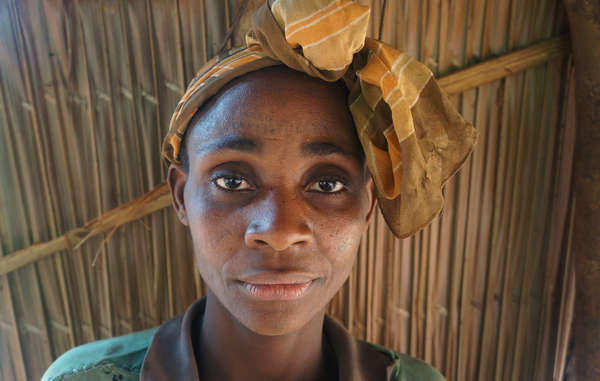
by Deep Green Resistance News Service | Sep 6, 2017 | Lobbying
Featured image: This Baka woman and her husband are among many tribal people in Cameroon who have been beaten by WWF-funded wildlife guards. They were attacked and had their belongings taken from them while they were collecting wild mangoes. © Survival International
by Survival International
The landmark mediation talks between Survival and the World Wildlife Fund (WWF) over breaches of Organization for Economic Co-Operation and Development (OECD) guidelines for multinational corporations have broken down over the issue of tribal peoples’ consent.
Survival had asked WWF to agree to secure the Baka “Pygmies’” consent for how the conservation zones on their lands in Cameroon were managed in the future, in line with the organization’s own indigenous peoples policy.
WWF refused, at which point Survival decided there was no purpose continuing the talks.
Survival lodged the complaint in 2016, citing the creation of conservation zones on Baka land without their consent, and WWF’s repeated failure to take action over serious human rights abuses by wildlife guards it trains and equips.
It is the first time a conservation organization has been the subject of a complaint under the OECD guidelines. The resulting mediation was held in Switzerland, where WWF is headquartered.
WWF has been instrumental in the creation of several national parks and other protected areas in Cameroon on the land of the Baka and other rainforest tribes. Its own policy states that any such projects must have the free, prior and informed consent of those affected.
A Baka man told Survival in 2016: “[The anti-poaching squad] beat the children as well as an elderly woman with machetes. My daughter is still unwell. They made her crouch down and they beat her everywhere – on her back, on her bottom, everywhere, with a machete.”
Another man said: “They told me to carry my father on my back. I walked, they beat me, they beat my father. For three hours. Every time I cried they would beat me, until I fainted and fell to the ground.”
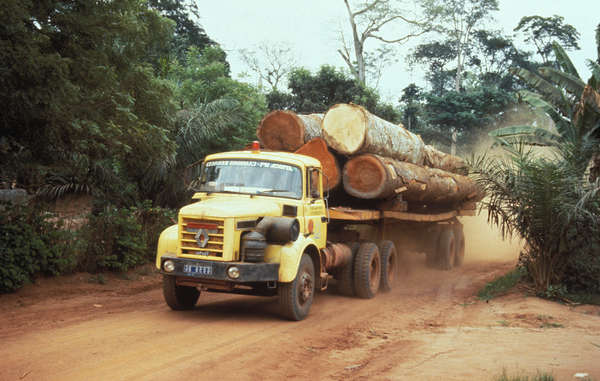
Conservation has been used as a justification for forcibly denying Baka access to their land, but the destruction of the rainforest by logging companies – some of whom are WWF partners – has continued. © Margaret Wilson/Survival
Background briefing
– Survival first raised its concerns about WWF’s projects on Baka land in 1991. Since then, Baka and other local people have repeatedly testified to arrest and beatings, torture and even death at the hands of WWF-funded wildlife guards.
– The OECD is the Organization for Economic Co-Operation and Development. It publishes guidelines on corporate responsibility for multinationals, and provides a complaint mechanism where the guidelines have been violated.
– The complaint was lodged with the Swiss national contact point for the OECD, as WWF has its international headquarters in Switzerland. Talks took place in the Swiss capital, Bern, between representatives of WWF and Survival.
– The principle of Free, Prior and Informed Consent (FPIC) is the bedrock of international law on indigenous peoples’ rights. It has significant implications for big conservation organizations, which often operate on tribal peoples’ land without having secured their consent.
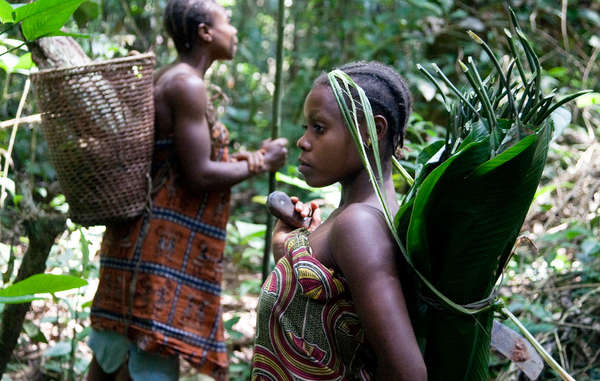
Tribes like the Baka have lived by hunting and gathering in the rainforests of central Africa for generations, but their lives are under threat. © Selcen Kucukustel/Atlas
Tribal peoples like the Baka have been dependent on and managed their environments for millennia. Contrary to popular belief, their lands are not wilderness. Evidence proves that tribal peoples are better at looking after their environment than anyone else. Despite this, WWF has alienated them from its conservation efforts in the Congo Basin.
The Baka, like many tribal peoples across Africa, are accused of “poaching” because they hunt to feed their families. They are denied access to large parts of their ancestral land for hunting, gathering, and sacred rituals. Many are forced to live in makeshift encampments on roadsides where health standards are very poor and alcoholism is rife.
Meanwhile, WWF has partnered with logging corporations such as Rougier, although these companies do not have the Baka’s consent to log the forest, and the logging is unsustainable.
Survival’s Director Stephen Corry said: “The outcome of these talks is dismaying but not really surprising. Conservation organizations are supposed to ensure that the ‘free, prior and informed consent’ of those whose lands they want to control has been obtained. It’s been WWF’s official policy for the last twenty years.
“But such consent is never obtained in practice, and WWF would not commit to securing it for their work in the future.
“It’s now clear that WWF has no intention of seeking, leave alone securing, the proper consent of those whose lands it colludes with governments in stealing. We’ll have to try other ways to get WWF to abide by the law, and its own policy.”
Watch: Baka father speaks out against horrific abuse
“Pygmy” is an umbrella term commonly used to refer to the hunter-gatherer peoples of the Congo Basin and elsewhere in Central Africa. The word is considered pejorative and avoided by some tribespeople, but used by others as a convenient and easily recognized way of describing themselves.
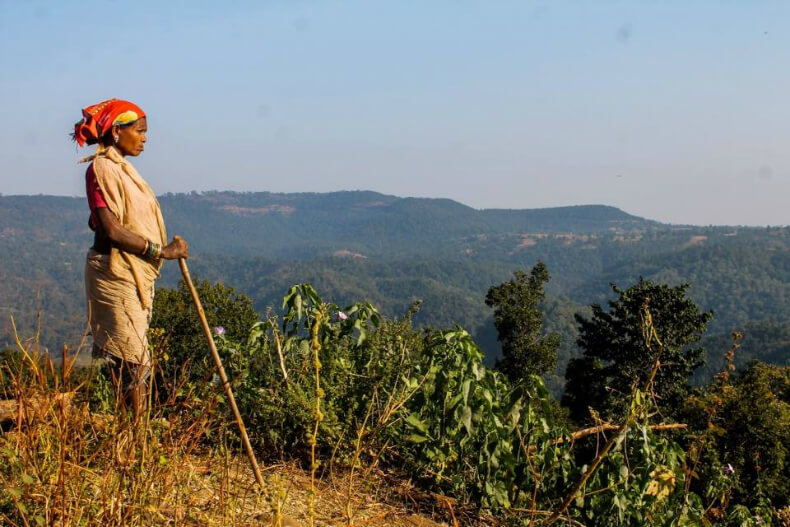
by Deep Green Resistance News Service | Apr 30, 2017 | Colonialism & Conquest
Featured image: A Baiga woman surveys the land in Amaniya panchayat, Chhattisgarh, much of which falls in the area of the proposed tiger corridor between Kanha and Achanakmar National Parks. In the tribal belt of central India, indigenous communities are being manipulated, evicted, and impoverished in the name of conservation. Photo: Heera Bai.
by Heera Bai / Intercontinental Cry
Throughout India today there are a total of 645 Adivasi communities recognized by the government. With a combined population of about 70 million, these communities maintain an impressive array of cultural identities, languages, customs and economies that go back millennia. But despite their resilience and their relative isolation from the perils of extreme extraction, Adivasis—the Hindi term for Indigenous Peoples—have not been able to escape any of the hardships that other Indigenous Peoples so often face around the world.
Across the Tribal Belt of Central India, where 90 percent of the population is still completely dependent on agriculture, indigenous communities are constantly being evicted from their ancestral lands to make way for development projects, industry, tourism and government-sanctioned conservation initiatives.
In the states of Madhya Pradesh and Chhattisgarh, the Baiga community have faced a legacy of evictions that dates back more than 30 years. They are constantly being forcefully, and often illegally, relocated from their fields and villages that live in and around the borders of the Kanha and Achanakmar National Parks.
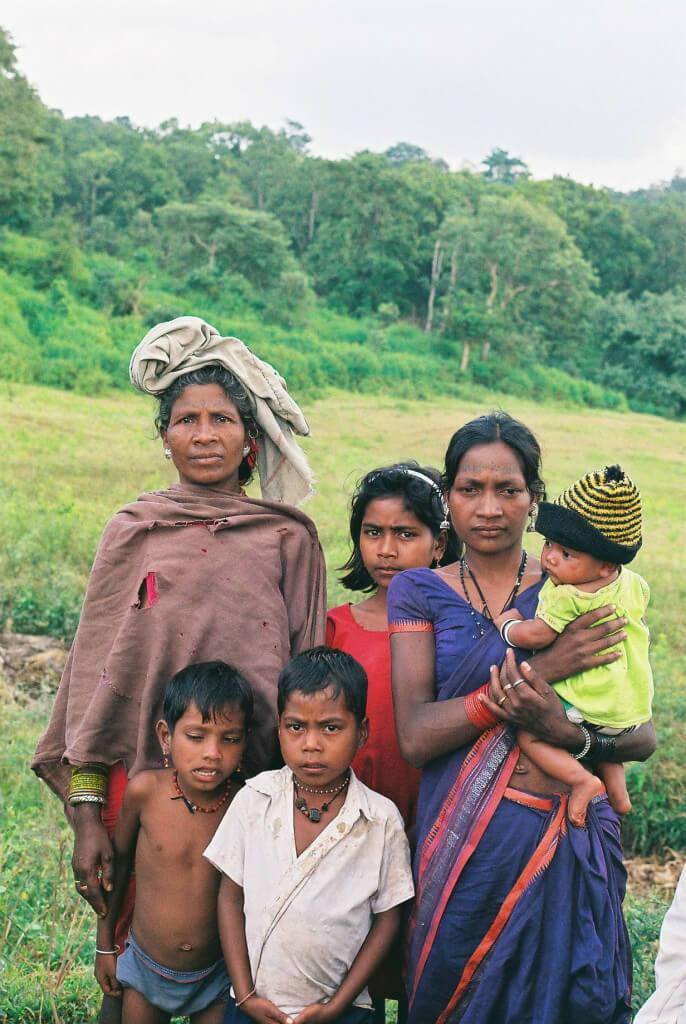
Women from Hirapur, a Baiga village which was relocated from Kanha National Park in the 1970s. “This lush green jungle – we can only see it, but we cant touch it. We cant take anything which was our traditions, our daily bread, it was everything to us. Our rights are written down in a book but we are illiterate.” Photo: Heera Bai
The Baiga are classified as a Particularly Vulnerable Tribal Group (PVTG) by the Indian Government, and the present adult generation had little access to education. The majority are illiterate and know no other language than their regional dialect. Their villages are incredibly isolated, accessible only by foot or motorbike on tracks through the forest. The distance between these villages makes cross-community solidarity or resistance logistically difficult, increasing their vulnerability to exploitation.
Until recently, the Baiga community was dependent on the jungle and the surrounding environment for survival. However, they existed in a symbiotic relationship with the forest generously providing them with everything they need including food, ‘jhari-booti’ (jungle medicine) and wood to build homes and tools. However, after decades of increasing rules and restrictions placed on their access to forest resources and the criminalisation of practices such as ‘bewar’ (shifting cultivation), their way of life has become increasingly difficult to maintain.
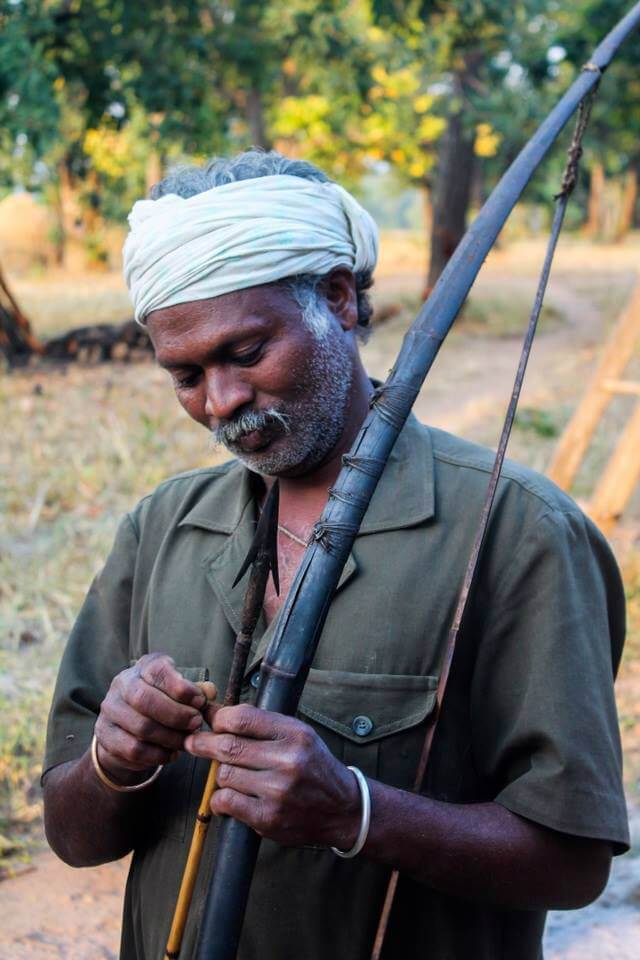
Noonsari, the makeshift village of displaced Baiga adivasi, in Mawai district Madhya Pradesh. This is a dhanoosna, a weapon used by their ancestors for hunting in the jungle. It takes a whole day to make a single arrow from peacock feather and cartilage. Photo: Heera Bai
“For us, only the jungle for us is good,” Bazaari Singh Baiga of the Peepatola village in Chhattisgarh said. “We don’t want fields or houses in another place. We want to stay living in the jungle, we don’t want to move to a city, where would we get wood from? We get everything we need from the jungle. If we moved from here we would die very quickly! We don’t buy things, we take everything from the jungle and make things ourselves with our own hands.”
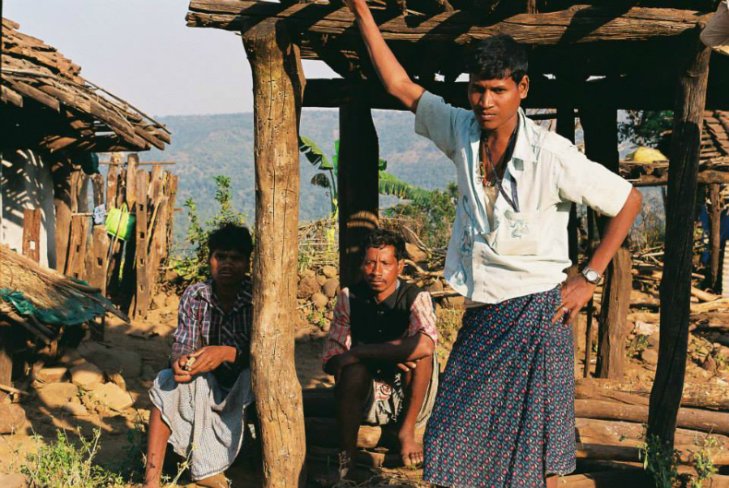
“We don’t want fields or houses in another place. We want to stay living in the jungle, we don’t want to move to a city, where would we get wood from? We get everything we need from the jungle,” says Bazaari Singh Baiga. Photo: Heera Bai
All Baiga villages in Kanha National Park in Madhya Pradesh have been displaced. The evictions began in the 1970s and the last five villages were evicted in 2013. It is a legal requirement that villagers give free, informed consent to the relocation of their village, but consent is forcefully taken after threats, harassment and manipulation.
“The Forest Department came and told us that if we don’t leave willingly they will bring elephants to trample our homes and fields,” Shakti Baiga said. Baiga lived in Benda, one of the last villages in Kanha evicted in 2013. “They brought documents into the village and made us sign it. But we’re illiterate, how could we have known that we were signing our land away?
“I had 5 acres of land in Benda. Here, I could only afford to buy 1.5 acres to support my whole family. I could only afford this land because chances are, this village will be also displaced in the near future. A new [Bhoromdeo] Wildlife Sanctuary has now been created and the fences are starting to go up around the village… There are only two families from Benda here, I don’t see any of the original community anymore.”
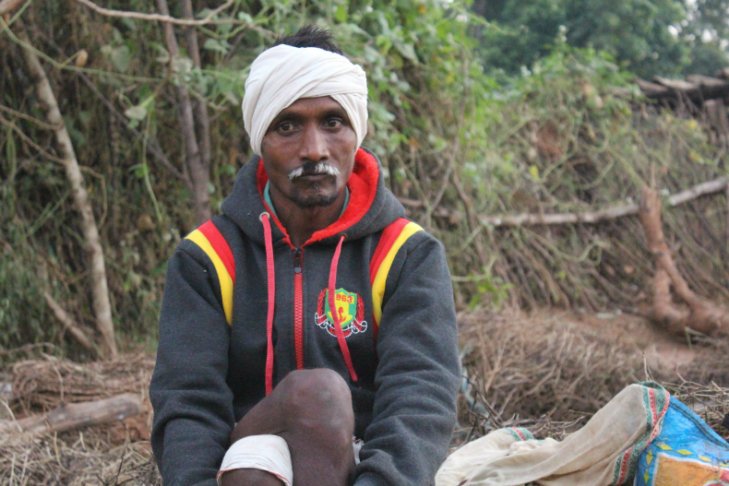
“How could we have known that we were signing our land away?” asks Shakti Baiga. Photo: Heera Bai
There is a strong World Wildlife Federation (WWF) presence in both parks. The infamous panda logo is seen in across the region, from the gates of the national park to small forest villages on the edge of the buffer zone. Despite denying any vested interest in tourism in Kanha, they offer $8,995 ‘tiger tours.’’ Survival International has confronted them about their complicity in illegal evictions in the National Park, but they have denied the illegality of these displacements.
The Forest Rights Act, implemented in 2006, supposedly recognizes ‘any traditional right customarily enjoyed’ by any ‘forest dwelling Scheduled Tribes’ or ‘Traditional Forest Dwellers’. These rights include not only those of forest habitation, but also ‘the right to cultivate for their livelihood, the right to collect minor forest produce, the right to graze cattle, the right to convert leases or grants (pattas) to titles, the right to manage the community forest resources, and the right to enjoy any customary/traditional practice.’
The Forest Rights Act also stipulates procedures for evicting a community from its land. The Panchayat Extension to Scheduled Areas (PESA) means that the Gram Sabha (village level decision making body) must give full, informed consent to the displacement. The community are supposed to be given three options: 1) Reject the eviction and stay on their land, 2) Agree to the eviction, and accept 10 lakh Rs in compensation, or 3) Agree to eviction, and move to a government provided Resettlement and Rehabilitation site.
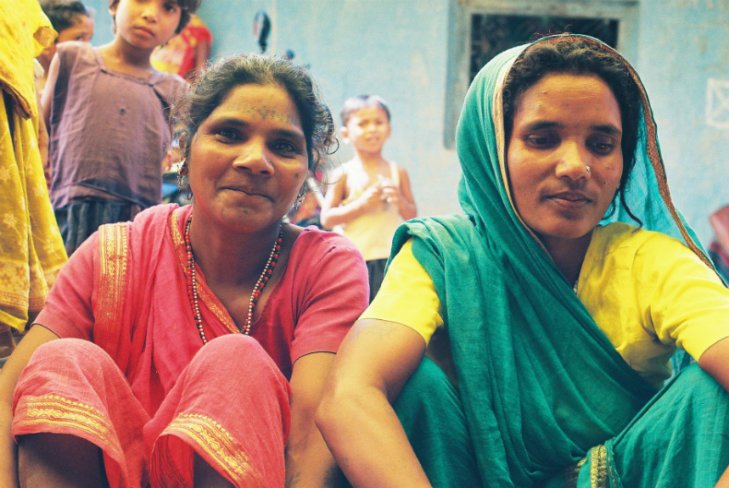
Maki Bai and Sombati Bai from Ajanpur (displaced, now squatting on land in Bhari village, Madhya Pradesh) “All the land that was ours before, where are we going to find that now? We won’t find it. we were the kings of the jungle, but here they treat us like dogs. It’s only sadness here. We can’t even taken wood. Our lives are like dogs!” Photo: Heera Bai
There is no evidence in any of the Baiga villages evicted in the Kanha National Park were given any choice in the relocation, no village was given the option to stay. Even when a rejection is given, this is manipulated; a ‘no’ at the village level gram sabha becomes a ‘yes’ at higher levels of government.
In recent years, the government has run out of state land around Kanha National Park to offer the evicted communities as part of a Resettlement and Rehabilitation package. Villagers from Johar, Benda and the three other villages that were evicted in 2013 received just 10 lakh per adult male, in compensation (women and children under 18 are entitled to nothing). Now, they are struggling to find land that they can afford to buy and the communities have scattered across the region.
In the second park, Achanakmar National Park in Chhattisgarh, there are still 19 tribal villages inside the Core Zone, and many more in the Buffer Zone. So far, five villages have been evicted from the Core, and five more have been given their eviction notice. Those evicted were rehabilitated in resettlement villages on the outskirts of the National Park, where the concrete houses and the dusty road is a far cry from the lush green surroundings they left behind. They were promised five acres of land, a home, a village school and two years of paid work. The fields are drying up after just two harvests, after two years the school building is still awaiting completion and the promised work is yet to materialise. Men of the village are starting to go to distant cities like Lucknow in order to find menial, exploitative daily wage labour.
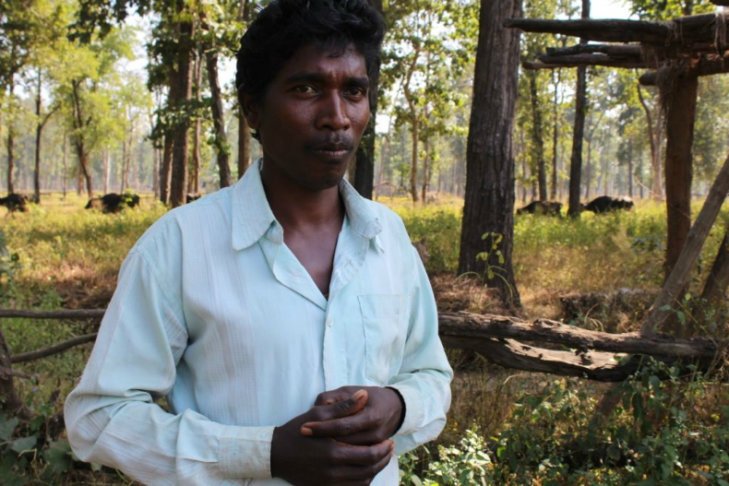
“If we have no choice but to leave Rajak, then we will only be relocated to Jhiriya Behera,” says Ramcharan Baiga. Photo: Heera Bai
Villagers still living in the forest have seen the resettled villages and refuse the offer of relocation. In Rajak, a core zone village, the villagers are unanimous in their rejection of the displaced and the proposed resettlement site. “Of course we want to stay in our village,” Ramcharan Baiga, a residents of Rajak, said. “If we can stay, then we will. We have told the District Collector that we will not go to Bharatpur because the land there is not sufficient to support our families. If we have no choice but to leave Rajak, then we will only be relocated to Jhiriya Behera.” The District Collector is refusing this compromise and insisting that the villagers have no choice in their resettled location.
The National Tiger Conservation Authority (NTCA), Ministry of Environment and Forests, have recently and surreptitiously passed an order stating that:
“In absence (of) guidelines for notification of critical wildlife habitats, no rights shall be conferred in Critical Tiger Habitats which is duly notified under the Wildlife (Protection) Act 1972.”
The Forest Rights Act states explicitly that the rights conferred within apply to all forest areas without exception; therefore the attempt by the NTCA to bypass this is illegal, and will be devastating for the communities affected. There is mounting evidence that suggests that the presence of Adivasis in critical wildlife habitats, including tiger reserves, is in fact conducive to preserving and managing these areas of biodiversity.
In addition to this, there are also plans to create a ‘tiger corridor’ between Kanha and Achanakmar. There are over 700 villages in the proposed area, and many residents do not even hold the most basic land titles. Their evictions will be quick and they will have no grounds to resist. WWF and the state government have assured people that there will be no evictions in the area, but local people do not believe this at all. There are villages about every 7 km in the proposed corridor area, meaning that tigers will not be able to move through the ‘corridor’ without presenting a huge threat to villages. Therefore locals have come to conclusion that the reassurances they have had about there being no evictions are not true.
“That’s what they said when Kanha became a national park, they said the same for Achanakmar. They have already started putting up fences and restricting people’s access to the forest,” said Naresh Bunkar, a local man who was been working with adivasi communities in the region for 30 years. “It’s all lies. Slowly slowly, everyone here is going to be evicted.”
Heera Bai is a freelance journalist who works at Brush & Bow, a platform for creative journalism, working on documenting individual stories through art and music. Follow them at brushandbow.com and on Twitter @brushandbow2
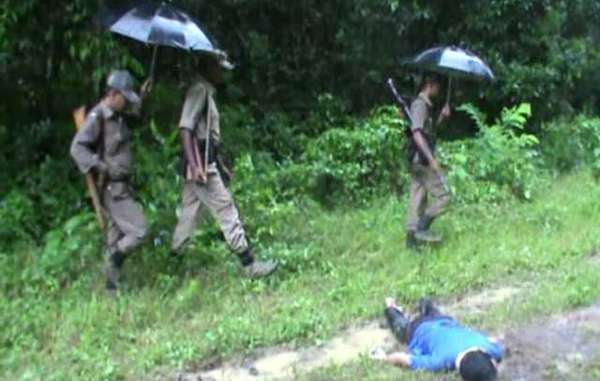
by Deep Green Resistance News Service | Feb 16, 2017 | Colonialism & Conquest
Featured image: Kaziranga park guards are heavily armed and instructed to shoot intruders on sight. © Survival International
by Survival International
A BBC investigation has revealed that tribal peoples living around a national park in India are facing arrest and beatings, torture and death under the Park’s notorious “shoot-on-sight” policy.
The report for television, radio and the BBC news website featured interviews with park guards, tribal people who have been affected by the policy in Kaziranga National Park, and a spokesman from WWF-India, which helps fund, train and equip park guards and advertises tours of the park through its website.
The park gets over 170,000 visitors each year. Fifty suspects were extrajudicially executed there in the last three years, and a severely disabled tribal man was shot dead in 2013. The BBC has estimated that 106 have been killed in the last 20 years. In the same period, only one official has been killed.
The BBC interviewed one local man who had been beaten and tortured with electric shocks during a detention by park officials before they realized he had no involvement in poaching.
The program also featured Akash Orang, a seven-year-old tribal boy who was shot in the legs by park guards last July. Akash said that: “The forest guards suddenly shot me” as he was on his way to a local shop. His father said: “He’s changed. He used to be cheerful. He isn’t any more. In the night, he wakes up in pain and he cries for his mother.”
Park guards have effective immunity from prosecution and are encouraged to shoot suspects on sight – without arrest or trial, or any evidence that they might have been involved in poaching. One guard admitted that they are: “Fully ordered to shoot them, whenever you see the poachers or any people during night-time we are ordered to shoot them.”
WWF has provided equipment – including what the BBC calls “night vision goggles” – which have been used in night-time operations and “combat and ambush” training. When asked by the BBC how donors might feel about their money being used to enforce this brutal treatment, WWF India’s spokesman said that: “What is needed is on-ground protection… We want to reduce poaching and the idea is to reduce it with involving other partners.”
Survival International is leading the global fight against these abuses and first brought the park’s high death toll and serious instances of corruption among Kaziranga officials – including involvement in the illegal wildlife trade they are employed to stop – to global attention in 2016.
Survival’s Director Stephen Corry said: “Conservation organizations, including WWF, are supporting a model of conservation which is resulting in gross human rights abuses. They have failed to condemn policies that are leading to widespread extrajudicial executions. For too long, conservation has relied on its positive public image to hide its horrific and sustained attacks on indigenous and tribal peoples’ rights. We’re working to stop this. It’s time for conservationists to work with tribal people, the best conservationists and guardians of the natural world. It’s time for conservation organisations to call for an end to shoot on sight policies.”
by Deep Green Resistance News Service | Jan 23, 2017 | Colonialism & Conquest
Featured image: Without access to their ancestral land, the Baka’s health has deteriorated and they face an uncertain future. © Survival International
by Survival International
An internal report commissioned by the World Wildlife Fund (WWF) into the impact of its conservation work in Cameroon on Baka “Pygmies” has been leaked after WWF denied it existed. It reveals:
—WWF knew that the Baka had not been consulted over the national parks which have taken over their land. However, the organization has since maintained publicly that there was “a high level of … community consent.”
—Some ecoguards patrolling the area “behave like masters and lords” towards the Baka, mounting “crackdowns” that are “terrifying.” Despite this, a WWF spokesman described the ecoguards as “performing their designated function of protecting the forests and securing the access and areas of forest communities, including … the Baka.”
—Many perpetrators of abuses are not disciplined when violations are reported by the communities “despite the communities’ condemnation, with proof.” WWF, however, continues to say publicly, “When unacceptable behavior has come to WWF’s attention… WWF has taken the issue up directly and emphatically with [the government], and improved behavior has seemed to follow.”
—“Most of the local villages are affected [by ecoguard abuse]” – but WWF maintained in a written submission to the OECD that “the possibility of ecoguard abuse does not currently seem to be a high priority for most Baka communities.”
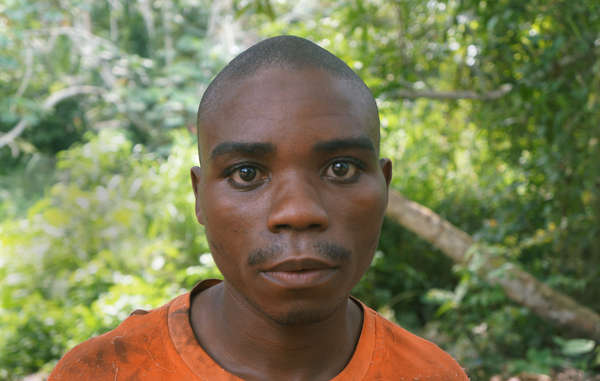
This Baka man was beaten by guards. Survival has spoken to dozens of similar victims across the Congo Basin.
© Survival International
Contrary to its own guidelines, WWF has never released the report, despite requests from Survival International and Baka activists. In an interview with the environmental magazine Mongabay, WWF’s “Head of Issues Management” Phil Dickie denied that WWF had commissioned any investigation into Survival’s allegations.
Survival International lodged a formal complaint in February 2016 with the Swiss National Contact Point of the OECD over WWF’s activities in Cameroon. The complaint was admitted in December 2016, the first time a non-profit organization has been scrutinized in this way.
One Baka man said: “The forest used to be for the Baka but not anymore. We would walk in the forest according to the seasons but now we’re afraid. How can they forbid us from going into the forest? We don’t know how to live otherwise. They beat us, kill us and force us to flee.”
Survival’s Director Stephen Corry said: “WWF commissions a report to look into its effect on the Baka, presumably including claims of abuse committed by the ecoguards it funds. The report confirms the abuse is widespread and routine. WWF then denies the report exists. It’s time for this big conservation organization to square up to the responsibilities it has to those who have seen their land stolen for conservation. And it’s time the world woke up to the horror that’s going on in the name of conservation. It’s not just Cameroon and not just WWF: the conservation industry has a history of taking tribal people’s land. It’s green colonialism and we’re doing all we can to fight it. Many conservationists know that tribal peoples are the best guardians of the natural world which is why the big conservation organizations should start listening to them rather than conspiring in their destruction.”
See here for a comparison of what WWF’s internal report says about Baka abuse with what WWF have said publicly, and what the Baka say. The full report is available on request.
“Pygmy” is an umbrella term commonly used to refer to the hunter-gatherer peoples of the Congo Basin and elsewhere in Central Africa. The word is considered pejorative and avoided by some tribespeople, but used by others as a convenient and easily recognized way of describing themselves.
by Deep Green Resistance News Service | Dec 18, 2016 | Colonialism & Conquest
Featured image: The Congo Basin tribes have lived sustainably in the forests of central Africa for generations.
© Selcen Kucukustel/Atlas
by Survival International
In an unprecedented protest, 19 “Pygmy” communities in central Africa have denounced conservation projects on their land. Eleven of the communities have urged conservationists to stop funding the anti-poaching squads who have abused them.
The Worldwide Fund for Nature (WWF) and the Wildlife Conservation Society (WCS) – two of the world’s biggest conservation organizations – have helped to create protected areas in the region from which tribal peoples have been illegally evicted.
The Baka and Bayaka “Pygmies” and their neighbors have endured years of violence, intimidation and abuse as a result of these conservation projects in Cameroon, the Congo, and the Central African Republic. But the organizations behind them, including WWF and WCS, have failed to change their approach, and continue to fund the squads.
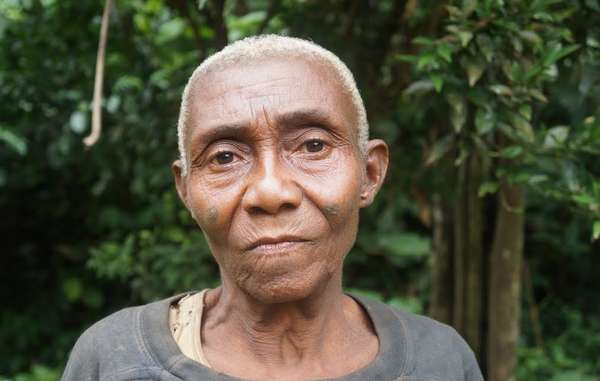
Ndoye, a Baka woman from Cameroon. Five people are reported to have died in her community alone at the hands of WWF-funded wildlife guards.
© Survival
In one letter Baka said: ”How are we going to survive in this world? We say to those who are giving money to [the conservationists]: ‘Do you want them to kill us?’ We no longer live well.”
Bayaka from the village of Socambo, said: “Despite the money that you provide to conserve the forest, we don’t benefit at all. Our ancestors lived perfectly well in this forest… Please think of us poor indigenous people who use our forest. We are fed up with how the project has cut us off from the forest.”
Bayaka from Mossapoula said: “We … are suffering a lot because of conservation. The guards threaten us, beat us, steal from us, even outside the park. And yet we have the right to enter the park. We ask you to come to Mossapoula before continuing your funding in order to hear our problems and seek our consent.”

Saki, a Bayaka woman whose husband was found murdered in the forest. From evidence at the scene, the family is convinced that he was killed by wildlife guards.
© Survival
The Bakwele chief of Ndongo said: “WWF has been coming here since 1996. We used to be very happy. But now we find ourselves marginalized and tormented in every way… We here are now only living on rice, really. Sir, your agents are very, very aggressive and we don’t want them to come here any more.
“In short, to those funders: if you have any projects, come to the field yourselves. I repeat: your agents are not here for work but for corruption. The guards have become the real poachers. They no longer respect the park limits. We no longer have access to the park.”
“Pygmies” face harassment and beatings, torture and even death while big game trophy-hunting tourists are encouraged. Tribal peoples are illegally evicted from large parts of their ancestral land and forced to live on roadsides where poverty and disease are rife. They have faced violence and plummeting health standards in the name of conservation – while WWF and WCS partner with logging companies like Rougier, CIB and SINFOCAM.
Survival’s Director Stephen Corry said: “As these powerful statements from “Pygmies” show, conservation projects are proving deadly for tribal peoples in the Congo Basin. As they see it, WWF and WCS have taken their land, ignored their rights, and continue to fund those abusing them. WWF and WCS have turned natural allies of conservation into its victims. The big conservation organisations really must start listening to these tribal peoples.”

Cameroonian wildlife guard Mpaé Désiré, who in 2015 was accused of beating Baka and in 2016 was arrested for involvement in the illegal wildlife trade.
© Facebook
Background briefing
– WWF has been active in the Congo Basin for decades. Survival first raised concerns over its proposed projects in 1991.
– The region is home to dense rainforests and several iconic species, including the giant pangolin, lowland gorilla and forest elephant. Tribal peoples like the Baka and Bayaka have been dependent on and managed this environment for generations.
– According to European Union reports, no logging activity in Cameroon is being carried out lawfully. Despite this, WWF has entered into partnerships with several companies who are active in the region.
– WWF cites the need to protect wildlife from poachers as the justification for funding, training and equipping wildlife guards. However, several of these guards have themselves been involved in the illegal wildlife trade. Earlier this year, for example, one guard, Mpaé Desiré was arrested for involvement in the illegal wildlife trade.
– A Baka man told Survival: “Guards used to open tins of sardines and leave them as bait to attract leopards, so they could hunt them for their skins.” Rainforest tribes have unparalleled knowledge of their environment, but WWF has instead put its faith in armed guards and corrupt officials.
Tribal peoples have been dependent on and managed their environments for millennia. Their lands are not wilderness. Evidence proves that tribal peoples are better at looking after their environment than anyone else. They are the best conservationists and guardians of the natural world. They should be at the forefront of the environmental movement.
But tribal peoples are being illegally evicted from their ancestral homelands in the name of conservation. The big conservation organizations are guilty of supporting this. They never speak out against evictions.
The big conservation organizations are partnering with industry and tourism and destroying the environment’s best allies.
Watch: Baka describe beatings and abuse at hands of anti-poaching squads.
“Pygmy” is an umbrella term commonly used to refer to the hunter-gatherer peoples of the Congo Basin and elsewhere in Central Africa. The word is considered pejorative and avoided by some tribespeople, but used by others as a convenient and easily recognized way of describing themselves















